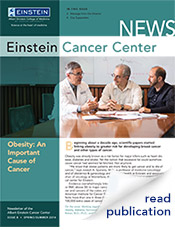

FULL STORY
Obesity: An Important Cause of Cancer
Does losing weight lower the risk of developing cancer?
Research on weight loss and cancer risk is still limited. But growing evidence suggests that weight loss may reduce the risk of several types of cancer, including breast cancer that occurs after menopause, more aggressive forms of prostate cancer and possibly other cancers, too.
About a decade ago, scientific papers started linking obesity to greater risk for developing breast cancer and other types of cancer. Obesity was already known as a risk factor for major killers such as heart disease, diabetes and stroke. Yet the notion that excessive fat could somehow cause cancer had seemed far-fetched. Not anymore. “We know that obese patients are more likely to get cancer and to die of cancer,” says Dr. Joseph A. Sparano, a professor of medicine (oncology) and of obstetrics & gynecology and women’s health at Einstein and associate chair of oncology at Montefiore, the University Hospital and academic medical center for Einstein. Evidence overwhelmingly links obesity (defined as a body-mass index, or BMI, above 30) to major cancers, including postmenopausal breast cancer and cancers of the colon, endometrium, kidney and esophagus. The American Institute for Cancer Research estimates that obesity, which affects more than one in three Americans and is on the rise, causes more than 100,000 extra cases of cancer in the United States every year.

This article originally appeared in the spring/summer 2014 issue of the Albert Einstein Cancer Center Newsletter.In a study published last year in the journal Cancer, Dr. Sparano, also associate director for clinical research at the Albert Einstein Cancer Center (AECC), and his colleagues analyzed data on nearly 7,000 women with stage 1 to stage 3 breast cancer who were treated with optimal chemotherapy and hormone therapy. After ruling out the impact of other diseases associated with obesity, his team found that women who were obese at the time of their breast cancer diagnoses were 30 percent more likely to relapse—and 50 percent more likely to die—than women who were not obese.
Cancer epidemiologist Dr. Thomas E. Rohan, associate director for population sciences at the AECC and leader of its Cancer Epidemiology Program and its Epidemiology Study Management and Informatics Facility, has found similar connections between a high BMI and several types of cancer. In collaboration with researchers at Einstein and other institutions, Dr. Rohan, a Harold and Muriel Block Chair in Epidemiology & Population Health at Einstein and professor and chair of the department of epidemiology & population health at Einstein and Montefiore, has found that high BMI is associated with increased risk for both ovarian and pancreatic cancer (but—interestingly—with reduced risk for lung cancer).
How can extra fat tissue accelerate or even cause cancer? AECC researchers from a wide range of disciplines are studying factors associated with obesity that may cause people to develop cancer.
The Insulin Connection
Being overweight is the major risk factor for developing type 2 diabetes. Like obese people, those with type 2 diabetes face a heightened cancer risk and are far more likely than nondiabetics to be diagnosed with cancer. High insulin may be a common factor linking both obesity and type 2 diabetes to cancer susceptibility. The pancreas secretes insulin to help cells absorb glucose from the bloodstream. In people with type 2 diabetes (by far the more common form of the disease) and in some obese individuals, cells become resistant to insulin and are unable to take in glucose and metabolize it. The pancreas responds to insulin resistance by pumping more insulin into the bloodstream, leading to high insulin blood levels.

Drs. Sparano, Rohan and Strickler work together to understand the interrelationship among obesity, diabetes, hormones and cancer.In addition to its well-known role in metabolism, researchers have long recognized that insulin can stimulate cells to multiply, which may increase cancer risk. It turns out that obese people—whether they have type 2 diabetes or not—often have elevated blood levels of insulin too. Einstein scientists led by Dr. Howard D. Strickler, a professor of epidemiology & population health and a Harold and Muriel Block Chair in Epidemiology & Population Health at Einstein, investigated insulin’s role in causing breast cancer. They did so by analyzing data from one of the largest-ever studies of postmenopausal women—a 12-year federally funded study called the Women’s Health Initiative (WHI). In a study published in 2009 in the Journal of the National Cancer Institute, the researchers found that excess insulin in the blood is a strong independent risk factor for breast cancer, suggesting that insulin may have a substantial role in explaining the obesity–breast cancer relationship.
Conversely, efforts to lower insulin levels may help prevent or treat cancer. A number of studies suggest that the diabetes drug metformin—developed in the 1920s to lower insulin levels—reduces the risk of breast cancer in postmenopausal women who have diabetes and improves the prognosis of breast cancer patients with diabetes. And it appears that metformin helps improve survival of diabetics with endometrial cancer, says Dr. Nicole S. Nevadunsky, an associate professor of obstetrics & gynecology and women’s health at Einstein and an attending physician in gynecologic oncology at Montefiore.
A current study funded by the National Institutes of Health is assessing how insulin interacts with a related hormone, called insulin-like growth factor (IGF), to influence the risk that endometrial cancer will recur. The leaders of the study are Dr. Gloria S. Huang, associate professor of obstetrics & gynecology and women’s health at Einstein and an attending physician in gynecologic oncology at Montefiore, and Dr. Mark H. Einstein, professor and vice chair for research in obstetrics & gynecology and women’s health at Einstein and Montefiore and professor of epidemiology & population health at Einstein.
And the American Cancer Society is funding research to examine how obesity, insulin and IGF may interact to influence aggressive prostate cancer phenotype. The leader of the study is Dr. Ilir Agalliu, an assistant professor of epidemiology & population health and of urology at Einstein.
Since dietary carbohydrates cause insulin levels to spike, Einstein researchers have wondered whether putting cancer patients on low-carb diets could be beneficial. Collaborating with Dr. Sparano, Dr. Eugene J. Fine, a clinical professor of radiology (nuclear medicine) at Einstein, carried out a pilot study on carbohydrate restriction in 10 patients with advanced, incurable cancer. The results, published in 2012 in Nutrition, indicated that a low-carbohydrate diet for four weeks could suppress insulin blood levels and was “safe and feasible.” The authors noted that if the results are confirmed in larger studies, “dietary manipulation may have the potential to be used as a complementary non-toxic approach to improve the effectiveness” of standard cancer therapies.
The Estrogen Question
Menopause occurs when a woman’s ovaries no longer produce estrogen. But low levels of estrogen can continue being produced even after menopause—primarily by fat tissue. Scientists have long known that excess body fat can boost estrogen levels in the body and that postmenopausal women with elevated estrogen levels are at increased risk for breast and endometrial cancer. But is estrogen by itself a link between obesity and cancer? To find out, Dr. Strickler and his Einstein colleagues further analyzed the WHI data. In a paper published in 2012, they reported that while estrogen is a risk factor, the relation of obesity with breast cancer risk is more strongly linked to insulin than to estrogen. The recent findings by Dr. Strickler’s team underline the potential for targeting the insulin-signaling pathway to identify individuals at high risk of breast cancer, so tumors can be detected early or perhaps even before they fully develop. The findings could even lead to efforts to reduce risk of tumor cells developing in the first place, by blocking the cancer-related component of insulin signaling.
Posted on: Thursday, November 20, 2014

Tablet Blog